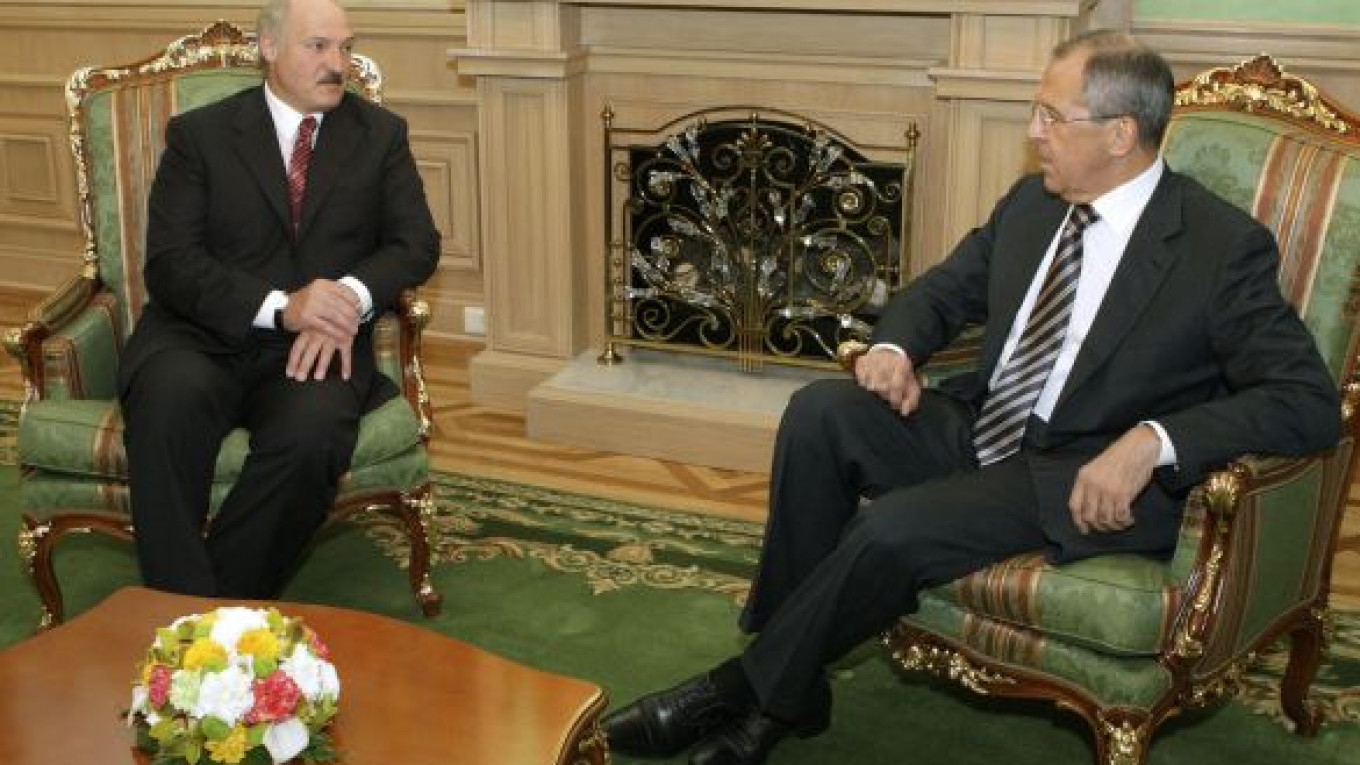Russia and Belarus raised the stakes Tuesday in their gas trade dispute, with Minsk threatening to suspend transit to Europe in a new "gas war," but Moscow assured its end consumers that supplies can be maintained through Ukraine.
Belarussian President Alexander Lukashenko ordered his government to halt flows of Russian gas to Poland, Germany and Lithuania until Gazprom paid $260 million in transit fees for the first half of this year, he said in a meeting with Foreign Minister Sergei Lavrov.
"I want to inform you about the conflict that, unfortunately, is growing into a gas war between Gazprom and Belarus," Lukashenko said in opening remarks at the Minsk meeting.
Polish Prime Minister Donald Tusk said his country was not suffering supply disruptions Tuesday afternoon. Marlene Holzner, the European Commission's spokeswoman on energy, told reporters that she was unaware of supply problems from any member states.
Gazprom spokesman Sergei Kupriyanov said Ukraine, which transits about 80 percent of gas from Russia, agreed to take over for Belarus to carry additional Russian fuel to European customers.
Earlier on Tuesday, Gazprom stepped up pressure on Belarus by reducing supplies to 70 percent of the country's needs. The measure represented a second 15 percent cut in as many days, as Gazprom insists that it is seeking $192 million in debt for its commodity.
Gazprom does not deny that it owes Belarus $260 million but says the sum has not been paid because Belarus is hindering the transfer.
Lukashenko told Lavrov that he had "borrowed some money from friends, and we will repay the gas debt in the immediate future," RIA-Novosti reported. It was not immediately clear to whom he was referring.
Supplies to Belarus dropped to 70 percent after its First Deputy Prime Minister Vladimir Semashko, according to Gazprom, threatened in a letter — received Tuesday morning — to replace any additional shortfall by tapping into flows traveling to Europe.
"Problems can hardly be resolved in such a tone and with such threats," Kupriyanov said, referring to the letter.
Gazprom says it is punishing Belarus for paying last year's lower price for the gas since January.
The measure also comes in the wake of an impasse that Moscow and Minsk reached in their oil trade talks. Belarus refused to accept Russia's continued export duties after the countries planned to enter a customs union, a position that likely infuriated Moscow and triggered what some Western political leaders had called its energy weapon.
IHS Global Insight analyst Lilit Gevorgyan predicted that Russia would eventually find a way to secure Lukashenko's loyalty.
"The Belarus-Russia gas row is likely to end with a new deal, which will promptly return Lukashenko to the realm of Russian influence," she said in a note to clients.
Lukashenko complained Tuesday that President Dmitry Medvedev added insult to injury in the standoff by using a "humiliating" phrase to reject a proposal from Belarus to pay the debt with the equipment and other goods it produces.
"Gazprom cannot be paid in pancakes, butter, cheese or any other substitutes for money," Medvedev said Monday, hinting at Belarus' considerable dairy industry.
Lukashenko said he took it as an affront.
"It doesn't befit the president of a friendly, neighboring … state to behave like this," he told Lavrov.
Gazprom deputy chief executive Alexander Medvedev, who oversees exports at the state gas giant, proposed on Tuesday that the European Union place officials along the transit route across Belarus to record any theft the country might commit. A similar arrangement was in effect during Russia's spat with Ukraine in January 2009, which resulted in heavy cutoffs to European countries in the dead of winter.
Despite potential transit disruptions, Gazprom reiterated that it would fully meet its targets for exports outside the former Soviet Union, its cash cow. Such deliveries will amount to 145 billion cubic meters of gas this year, up 3 percent from last year, Medvedev said.
"If we forecast something in June, these forecasts come true just like dreams do," he joked.
Gazprom expects to rake in $45 billion in revenue on sales outside the former Soviet Union this year, compared with $42.5 billion last year, Medvedev said.
A Message from The Moscow Times:
Dear readers,
We are facing unprecedented challenges. Russia's Prosecutor General's Office has designated The Moscow Times as an "undesirable" organization, criminalizing our work and putting our staff at risk of prosecution. This follows our earlier unjust labeling as a "foreign agent."
These actions are direct attempts to silence independent journalism in Russia. The authorities claim our work "discredits the decisions of the Russian leadership." We see things differently: we strive to provide accurate, unbiased reporting on Russia.
We, the journalists of The Moscow Times, refuse to be silenced. But to continue our work, we need your help.
Your support, no matter how small, makes a world of difference. If you can, please support us monthly starting from just $2. It's quick to set up, and every contribution makes a significant impact.
By supporting The Moscow Times, you're defending open, independent journalism in the face of repression. Thank you for standing with us.
Remind me later.


